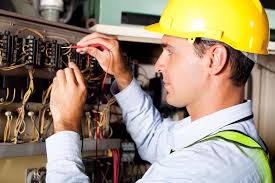
Mastering the Art of Electrical Fitter: A Guide to Success in the Industry
The Role of an Electrical Fitter in the Modern Industry
Electrical fitters play a crucial role in various industries, ensuring that electrical systems are installed, maintained, and repaired to meet safety standards and operational requirements. Their expertise is essential in powering everything from residential buildings to large industrial facilities.
One of the primary responsibilities of an electrical fitter is to interpret technical drawings and specifications to determine the best way to install electrical systems. They must have a solid understanding of electrical principles and regulations to ensure that installations comply with industry standards.
In addition to installation, electrical fitters are also responsible for testing and troubleshooting electrical systems to identify and rectify any faults or issues. This requires a keen eye for detail and strong problem-solving skills to ensure that systems operate efficiently and safely.
With the rapid advancements in technology, electrical fitters must stay up-to-date with the latest trends and innovations in the industry. This includes knowledge of renewable energy sources, smart technologies, and energy-efficient solutions that are increasingly being integrated into modern electrical systems.
Furthermore, safety is paramount in the work of an electrical fitter. They must adhere to strict safety protocols and regulations to prevent accidents and ensure the wellbeing of themselves and others on-site. Regular training on safety procedures and best practices is essential for all electrical fitters.
In conclusion, the role of an electrical fitter is diverse and demanding, requiring a combination of technical expertise, problem-solving skills, and a commitment to safety. As technology continues to evolve, so too will the responsibilities of electrical fitters as they adapt to meet the changing needs of the modern industry.
Top 5 Essential Tips for Electrical Fitters: Safety, Maintenance, and Skills Enhancement
- Always follow safety procedures when working with electricity.
- Regularly inspect and maintain electrical systems to ensure they are in good working condition.
- Stay up-to-date with the latest electrical regulations and standards.
- Use proper tools and equipment for electrical installations and repairs.
- Seek additional training or certifications to enhance your skills as an electrical fitter.
Always follow safety procedures when working with electricity.
It is paramount for electrical fitters to always adhere to strict safety procedures when working with electricity. This includes wearing appropriate personal protective equipment, following industry guidelines, and ensuring that all electrical systems are properly shut off before commencing any work. By prioritising safety at all times, electrical fitters can prevent accidents, protect themselves and others, and ensure that projects are completed efficiently and without incident.
Regularly inspect and maintain electrical systems to ensure they are in good working condition.
It is crucial for electrical fitters to regularly inspect and maintain electrical systems to guarantee they are functioning optimally. By conducting routine checks and maintenance, potential issues can be identified and addressed promptly, preventing costly repairs and ensuring the safety and efficiency of the systems. This proactive approach not only extends the lifespan of the electrical components but also minimizes downtime and enhances overall performance, making it a fundamental practice for every skilled electrical fitter.
Stay up-to-date with the latest electrical regulations and standards.
It is essential for electrical fitters to stay up-to-date with the latest electrical regulations and standards to ensure that their work complies with industry requirements and safety protocols. By keeping abreast of changes in regulations, such as wiring rules and safety guidelines, electrical fitters can maintain high standards of quality and safety in their installations and maintenance tasks. Continuous learning and adherence to updated standards not only enhance the professionalism of electrical fitters but also contribute to a safer working environment for themselves and those around them.
Use proper tools and equipment for electrical installations and repairs.
Using the correct tools and equipment is crucial for electrical fitters when carrying out installations and repairs. By using the appropriate tools, such as voltage testers, wire strippers, and insulated screwdrivers, fitters can ensure the work is done safely and efficiently. Proper tools not only help in completing tasks accurately but also reduce the risk of accidents and damage to electrical systems. Investing in high-quality tools is essential for every electrical fitter to maintain professionalism and ensure the job is done to the highest standards.
Seek additional training or certifications to enhance your skills as an electrical fitter.
To excel as an electrical fitter, it is advisable to seek additional training or certifications to enhance your skills and stay abreast of industry advancements. By investing in continuous learning, you can expand your knowledge base, improve your problem-solving abilities, and increase your value as a professional. Whether it’s mastering new technologies or gaining expertise in specialised areas such as renewable energy systems, acquiring additional training and certifications can open up new opportunities and help you stand out in a competitive field like electrical fitting.
